Review: South Coast Repertory Presents World Premiere Play JOAN
Playwright Daniel Goldstein offers a satisfyingly funny overview of pioneering comedy legend Joan Rivers.
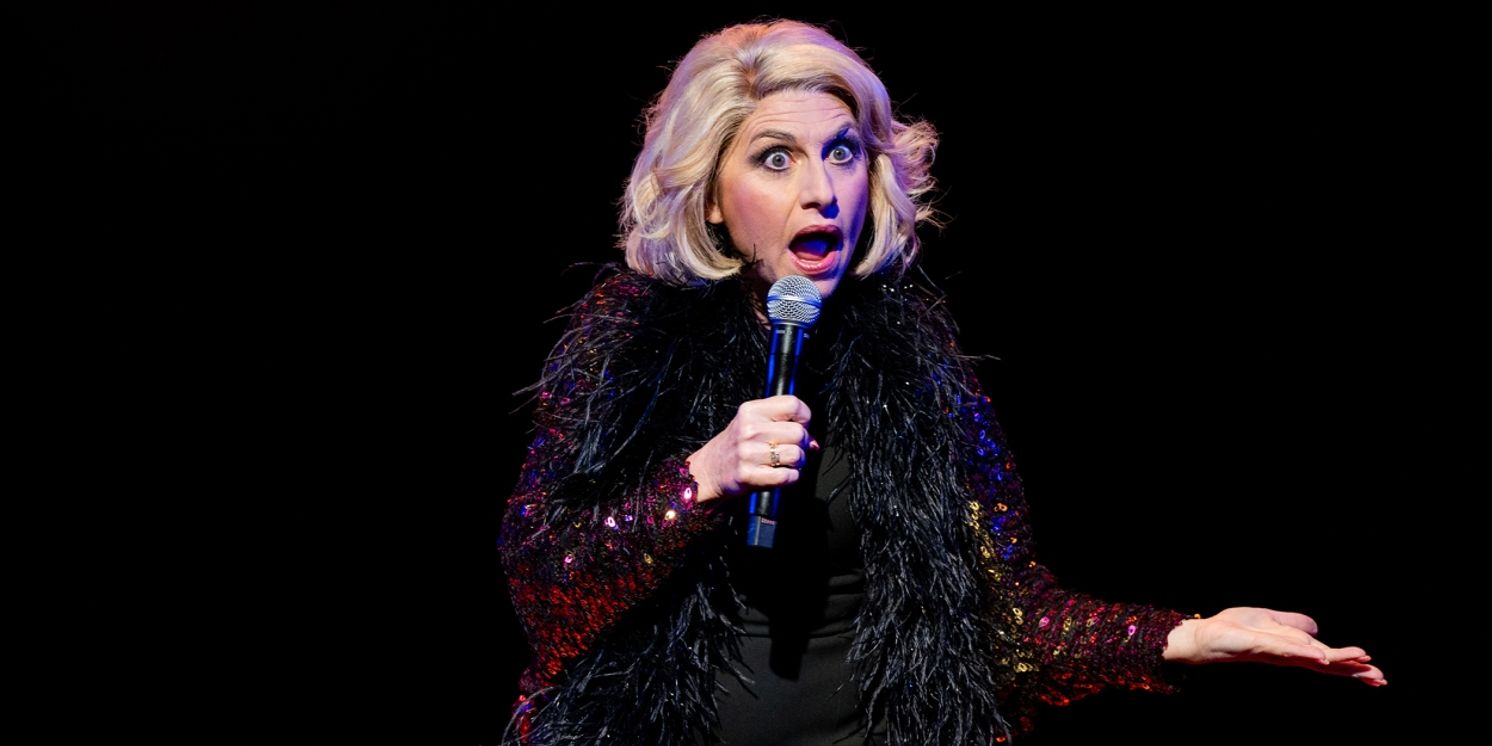
This past Wednesday, the day after one of the most contentious elections in US history, I spent most of it in a state of shock from the events of the night before, occasionally breaking into spontaneous outbreaks of tears, feeling somewhat numb but still needing to find some kind of internal boost to get back to work.
Frankly, the last thing I wanted to do was leave the protective bubble of my home to go see a play I was assigned to review that evening.
Thankfully, the play turned out to be a welcome temporary distraction—offering plenty of laughs and a bit of nostalgic hilarity in its portrayal of one particular real-life, unabashedly brazen woman that, in her own right, broke so many barriers in a usually male-dominated industry that even the men in her periphery had to acknowledge her genius.
That pioneering woman happens to be American comedian, actress, writer, producer, and television host Joan Rivers, the subject of a funny and intriguing new play by Daniel Goldstein appropriately titled JOAN, which is now having its world premiere run at OC's Tony Award-winning South Coast Repertory in Costa Mesa, CA through November 24, 2024.
Helmed by SCR's own artistic director David Ivers, this flattering, clearly authorized bio-play about the comedy legend—daughter Melissa Rivers is credited as a "creative consultant" and is a heavily featured character in the play—is presented as a dramatized highlights reel made up of a specific series of rushed-through bullet points of Rivers' life, occasionally stretching the view for dramatic punctuation and over-emphasizing narrative buttons to hammer home Joan's internal feelings, even though those internal feelings are pretty much reflected in whatever comes out of her mouth, whether as dialogue exchanges or direct addresses to us, the audience.
One thing is for certain: Rivers is indeed a highly-determined, extremely witty, tenacious trailblazer, and the play focuses much of its energies telling the audience this, in a way, with an "ohmigosh, can you believe Joan achieved all of this?" sort of humble brag.
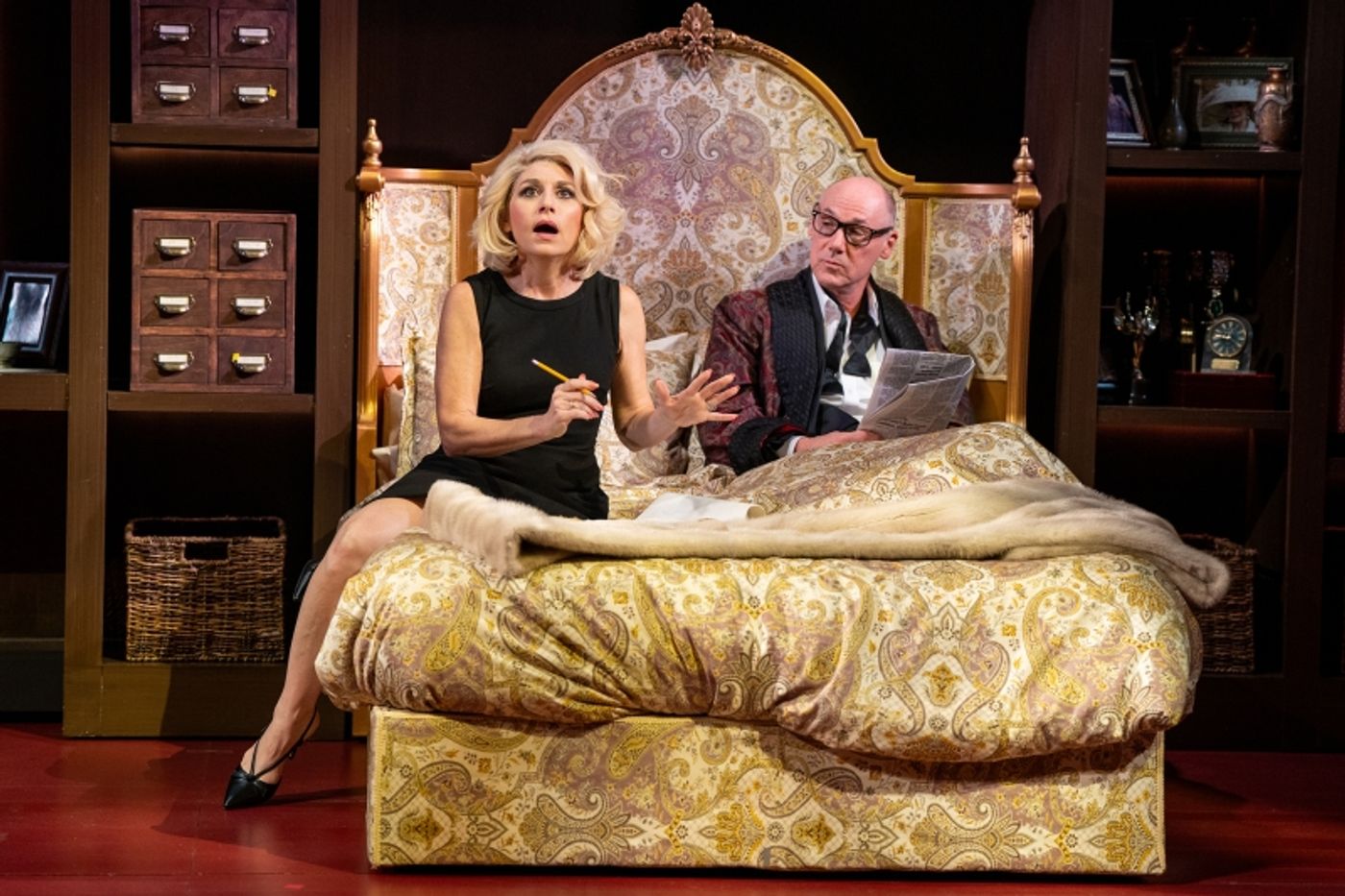
We buy into the biased presentation mostly because Rivers is still a naturally fascinating subject who is cheekily self-effacing and, yes, so unapologetically outspoken (I mean, her generous use of colorful language about everything from sexuality to celebrities is pretty ballsy for its time). But like most comedians—regardless of gender—her humor is borne out of creative necessity, and as a way to express her NSFW thoughts… backlash be damned. In a roundabout way, it is also her way of proving that she can play along with the big boys even if that sandbox was previously reserved just for males.
It is this obvious complex of trying to prove herself constantly that basically becomes the entire persona presented to us without any subtlety. Success in the field of comedy is a must for her, especially when so many in her orbit didn't think it was appropriate for her to do so.
To avoid any ambiguity with her intentions, the play employs lots of fourth-wall breaking just in case we didn't get that drive, which, coincidentally, mirrors Rivers' signature catchphrase "can we talk?"—as if her comedic material is really just a disguised request for conversation so that she can better explain herself through her own words.
The resulting new play—getting its first full production in front of an audience here in Orange County—is indeed very funny, and, at times, even very touching, but it also feels very much still like an on-going work-in-progress, with plenty of room for further improvement but already displays a great foundation we can all tell is there. Perhaps that still-in-progress vibe emanates from its core because the play, in its current form, feels like it is doing a lot more telling than it is showing.
That is no fault of the superb Tessa Auberjonois, a frequent SCR presence who has been tasked to bring Rivers to life on this stage. In an incredibly vibrant, full-throated, gutsy performance that should earn her lots of positive notices and award-worthy accolades, Auberjonois captures the essence of the real-life Rivers masterfully, not only in her signature raspy speech cadence that most of us will recognize (close your eyes and you swear it's the real Joan talking), but also Rivers' inimitable personality quirks, her acerbic, stabbing delivery, her whip-smart comic timing, and, we can suspect, her deep-rooted vulnerable gravitas. It's not so much an imitative caricature as it is a genuinely earnest, studied portrait that seeks to honor the real-life woman but also make her a relatable human being for even people who weren't necessarily fans of her and her work.
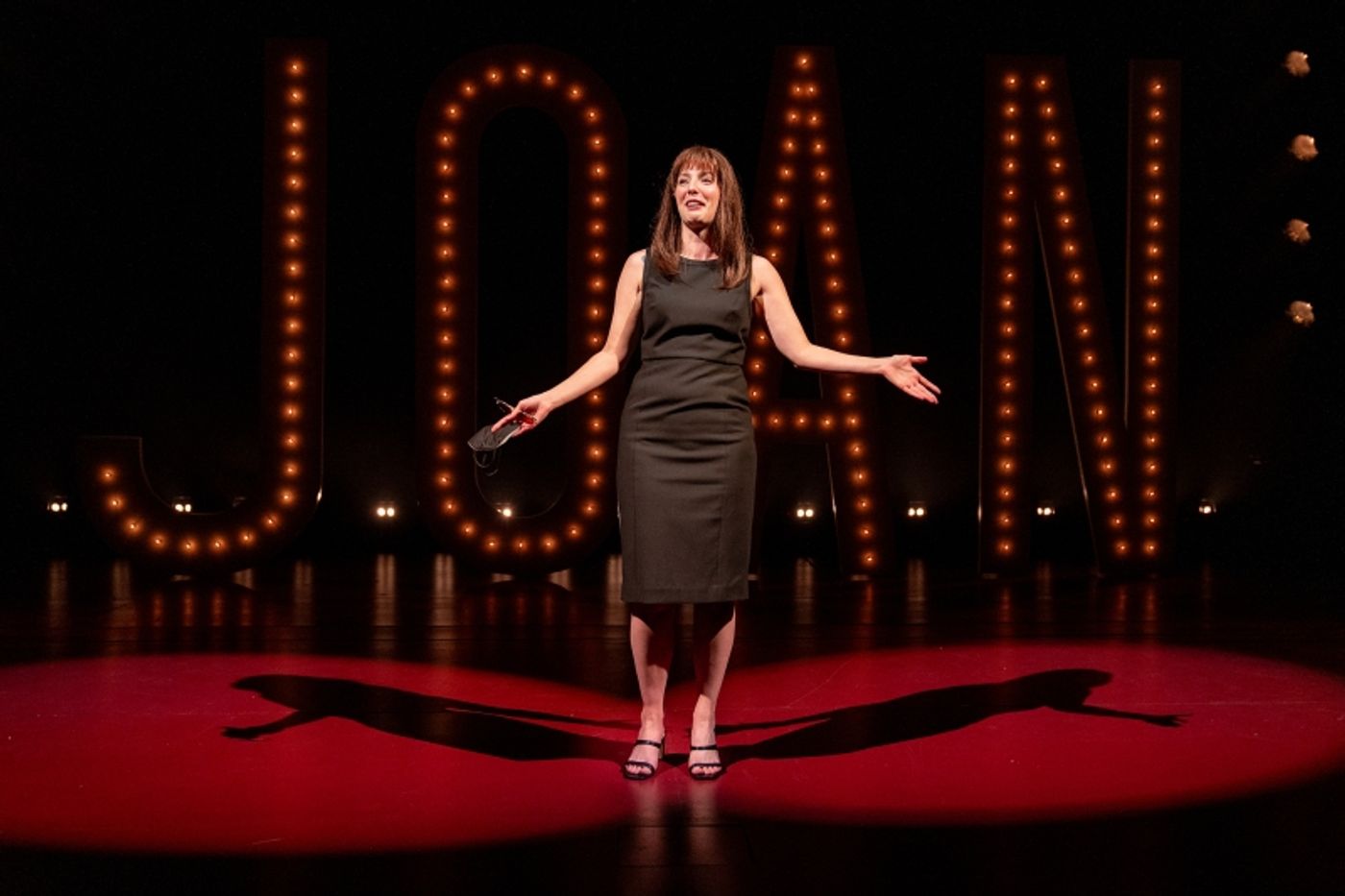
That's quite a role requirement, and Auberjonois does a stunning job, even from her first appearance.
When the play begins, cast member Elinor Gunn walks out and introduces herself directly to us as Joan's daughter Melissa, and casually talks to us in the present day to "explain" the machinations of the play we are about to experience, lest we somehow get confused: that she, Melissa, will actually be playing Joan as a younger girl first but will later switch back to being herself, while her mother Joan (Auberjonois) has agreed to portray Joan's own demanding mother, Mrs. Molinsky, first before later switching back to being Joan again for the rest of the play.
The reasoning, we are told, is that no one but Joan herself could portray her own mother better than anyone else can, since, well, she knew her best. Sure… but why do we need to be told this? And so we then initially ponder… from whose true point of view is this play coming from—Joan's or Melissa's?
On several occasions, the pair even urge each other to "tell" the audience something, or not to tell them another thing, well aware that they are presenting a play about their lives for us. It's an interesting staging choice, but by no means off-putting.
I suppose it is this sort of purposely meta acknowledgment—amplified by its occasional direct addresses to the audience—that makes the play way more interesting than it could have been because, otherwise, the play mostly opts to fast-forward through Rivers' timeline in order to get to just a few specific points faster that Goldstein (and, perhaps, Melissa) thought might be more interesting for us to see dramatized.
For the most part, that assessment is pretty on the nose once the play arrives at each of the carefully curated vignettes that explore significant moments in Rivers' life. These include meeting her first husband (finally quieting her mother's demands), her first time on the Tonight Show opposite her idol Johnny Carson, her intriguing personal and professional relationship with her second husband Edgar, and all the way to her late-stage career reinvention as a sharp-tongued red-carpet commentator alongside her daughter, now her best friend.
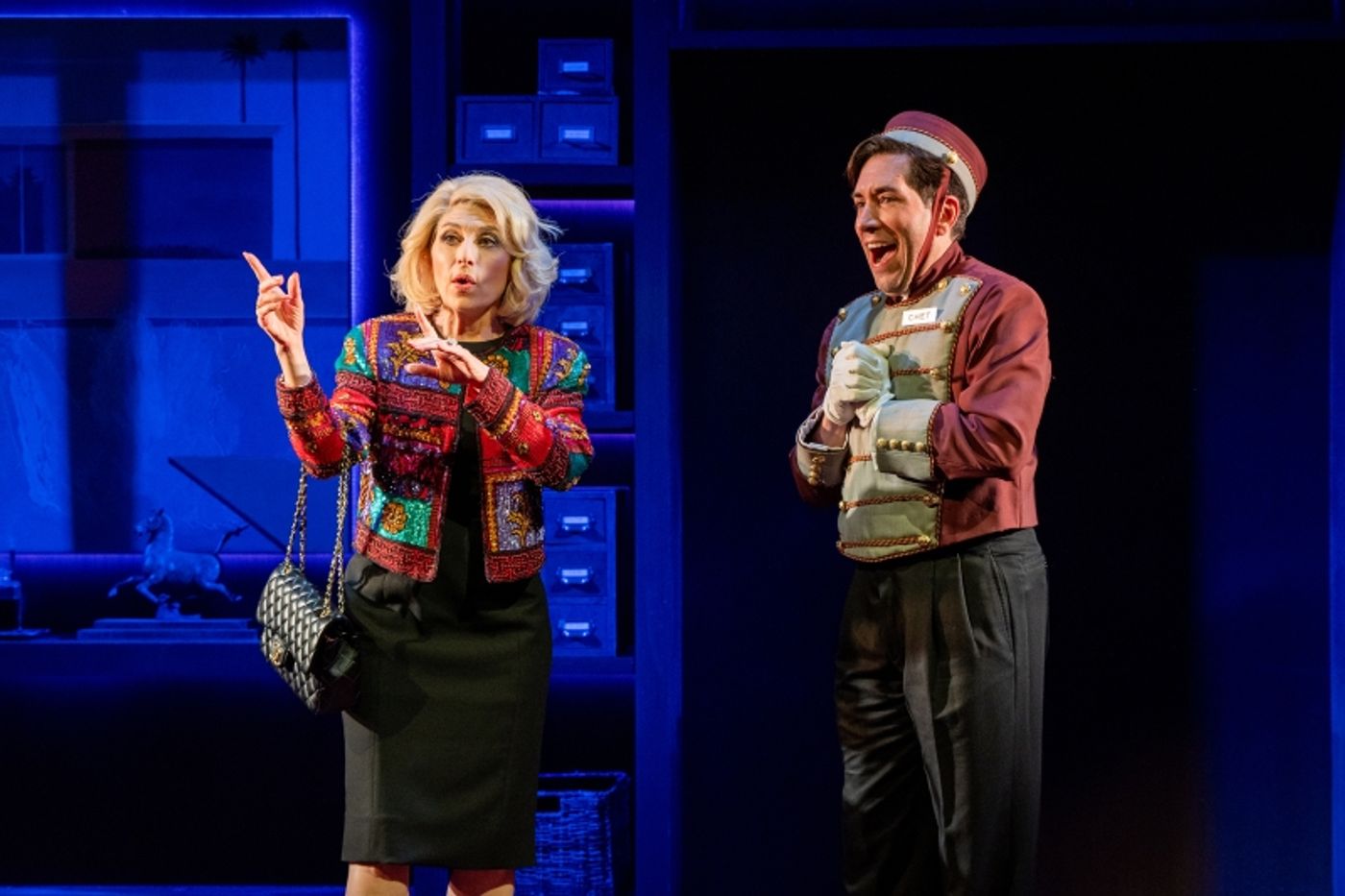
While we do get a general sense of who Rivers is through these vignettes, the play, however, rushes through everything else in between, including Rivers' rise in her early stand-up career. I do hope that subsequent productions of this play would show more of her comedy routines recreated, at the very least to prove just how funny and groundbreaking her initial stand up routines were, which then would explain more tangibly why she suddenly gets tapped to do the Tonight Show from relative obscurity (based on the little we do see, we sort of just have to assume she was just super amazing).
The Reader's Digest summation of some of her life becomes blatant in a good portion of the play. So where's her rise as the Queen of QVC post-financial troubles? Where's the comedy that could've been mined from her and Melissa playing themselves in the TV movie about their lives? How did she land the gig decimating celebrities' red carpet looks?
Granted, there is perhaps a lot more juicy things to pack into a 100-minute, no intermission play, so, to be fair, what we do see highlighted makes for a satisfying play on the whole. And to the production's credit, Gunn and Auberjonois do also receive excellent support via co-stars Andrew Borba, who plays not only Johnny Carson but also Joan's father and, later, her second husband Edgar Rosenberg, and Zachary Prince, who also plays multiple roles that include Jimmy Fallon all the way to a very memorable hotel bellhop/fanboy. This cast of five should be commended for keeping everything moving with nary a lull in its midst.
Visually, the play keeps things fairly simple, from the minimalist wall shelf back drop, giant marquee lights, and the slid-in furniture pieces designed by Wilson Chin to the retro classic wardrobe basics designed by Kish Finnegan.
But the play does itself much narrative good spending a significant amount of time exploring Rivers' relationship with her second husband Edgar (Borba, who does an exemplary job opposite Auberjonois), from their unexpected first retreat-turned-getaway vacay to their volatile disagreements regarding Rivers' show. Here, for the first time, we get to see how Rivers was finally able to blend her life ambitions on and off the stage, but also reiterating her seemingly life-long goal to make her career success in comedy as her ultimate identifier.
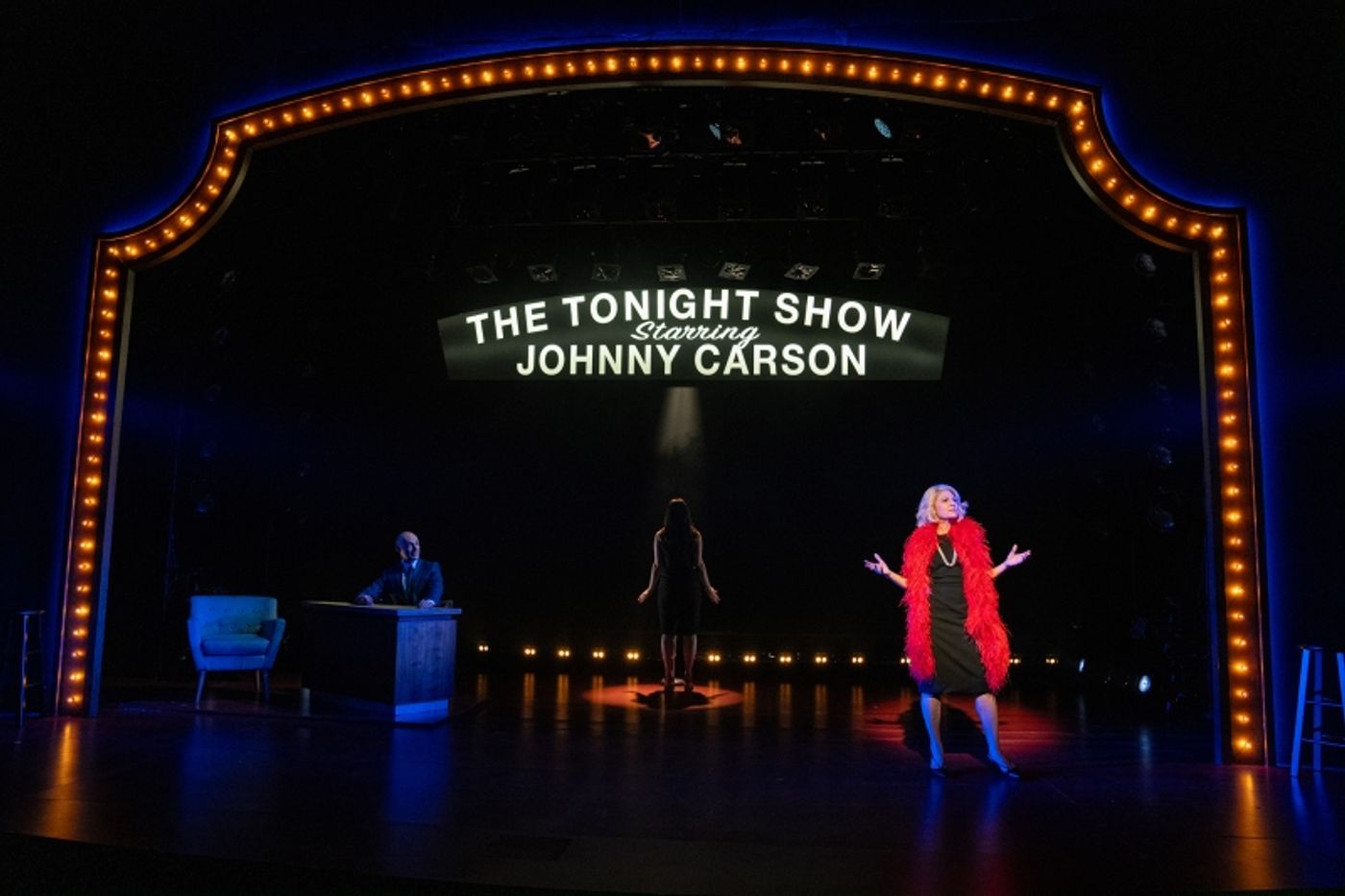
Photo by Scott Smeltzer.
Born as Joan Molinsky to upward-mobility-obsessed Jewish immigrant parents in Brooklyn, New York, young Joan—later raised in Larchmont—was never the girl to turn heads amongst the boys in her neighborhood. But she soon discovered early on that she was naturally funny, which she saw as a way to stand out and, maybe, even become a possible career trajectory. As expected, her parents wanted nothing more than for her to just find a man to marry and raise a family.
But Rivers had other plans. Taking on a new stage name and working her way through basement comedy rooms in the 1950s, the naturally witty Rivers eventually broke barriers by finding notable success as a comic and as a writer in the 1960s—much to the surprise of her parents since it's an occupation that isn't necessarily welcoming to women, but, against all odds, somehow made room for her. And thanks to her willingness to cover topics that were considered taboo at the time, she slowly rose to fame and eventually gained national attention with her lauded debut on The Tonight Show Starring Johnny Carson, where her distinctive comedic style quickly won her fans and the admiration of its host (the play recreates the exciting moment she gets called to sit at Carson's guest chair, but I wish we got the entire stand up routine she performed that evening).
Carson soon became her mentor, and Rivers frequently appeared on the show throughout the years, eventually becoming one of the show's most popular guest hosts. Her career takes off, and she became synonymous for her acerbic wit, her unique vocal delivery, and her ribald comedy routines that tackled provocative subjects—especially about gender, social norms, and celebrity culture.
But soon her ambitions get the best of her. She later caused a rift between her and Carson when she accepted the offer to become the first woman ever to host an eponymous late-night network talk show, The Late Show Starring Joan Rivers in 1986 for the just-launched Fox Network, essentially becoming Carson's competition. Unfortunately for her, though, she does so without first notifying her mentor, which we see partially play out in the play. At the same time, we also see that, behind-the-scenes, the show proved to be a cause of tumult between her and her husband Edgar as well, who served as the show's producer—that is, until the network asks him to leave, much to Rivers' protestations.
Despite the short-lived show's cancelation, it still solidified Rivers as a significant figure in entertainment history.
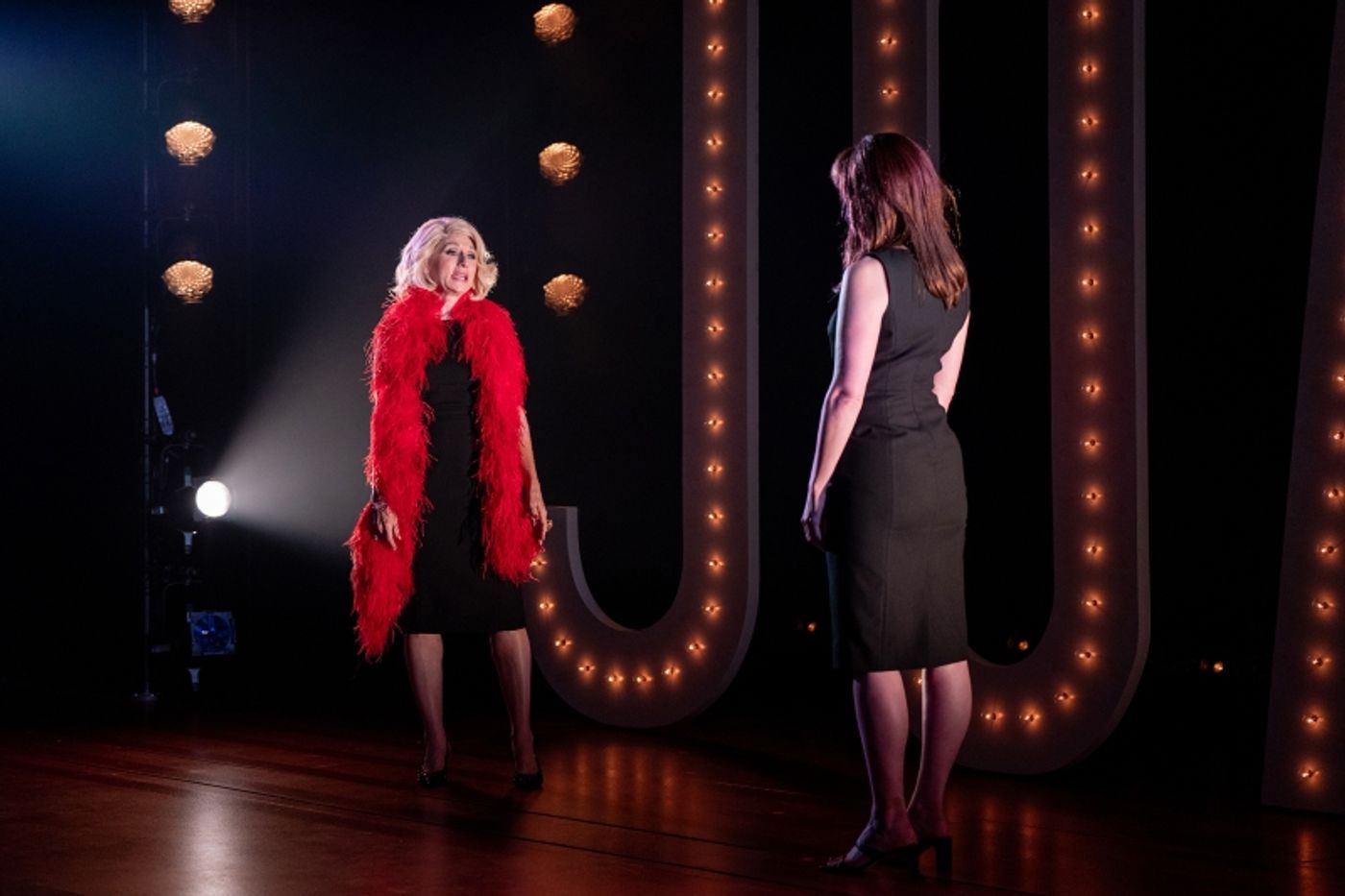
Throughout a career filled with many ups and downs, Rivers became known for her resilience and ability to reinvent herself, ushering several comebacks that saw her rising above many obstacles. Despite these personal and professional challenges—including bankruptcy and the tragic death of her husband—Rivers continued to work prolifically, performing stand-up, writing books, and producing television content well into her later years including the creation of the hit show Fashion Police, where she infamously satirized celebrity fashion without a filter, a gig that made her a red-carpet mainstay with her daughter, Melissa.
Tragically, and rather unexpectedly, Rivers passed away on September 4, 2014, after complications from a minor throat procedure.
Alas, her goal of making her mark paid off because her legacy as a pioneering comedian who paved the way for future generations of female comics remains influential, and her fearless approach to humor continues to inspire, which we see play out in hit shows about female comics like The Marvelous Mrs. Maisel and Hacks.
And while part of me wishes the play would have shown more of these multiple "comebacks" from her latter years—instead of just rushing to the hurried conclusion the play opts to show—as it stands, the play is still quite absorbing and hilarious with open room for further tweaks and edits. More than anything, though, the play has found its incredible voice via Auberjonois' remarkable performance, which by itself is reason enough to see the production now.
** Follow this reviewer on Instagram / Twitter X / Threads: @cre8iveMLQ **
-----
Photos by Scott Smeltzer, courtesy of South Coast Repertory.
Performances of JOAN at South Coast Repertory continues through November 24, 2024. Tickets can be purchased online at www.scr.org, by phone at (714) 708-5555 or by visiting the box office at 655 Town Center Drive in Costa Mesa.
***
Reader Reviews
Videos

